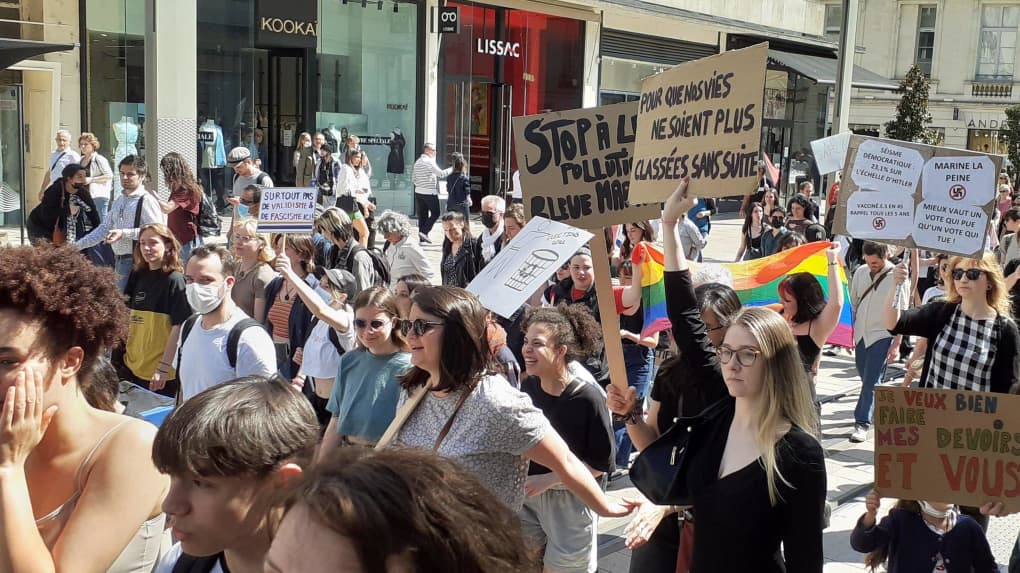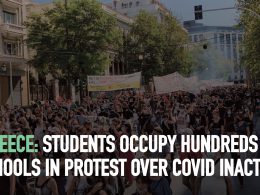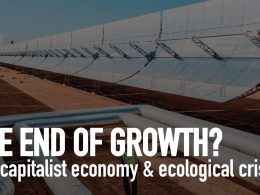In the context of the crisis of capitalism, amplified by the disastrous management of the pandemic and the imperialist war in Ukraine, the 2nd round of the French presidential election will see Emmanuel Macron up against Marine Le Pen. Is this a simple repetition of the 2017 elections? Only on the surface write Nicolas Croes, a member of Left Socialist Party, a member of our sister organisation in Belgium.
With the dramatic collapse of the pivotal parties of the Fifth Republic (the social democratic PS and the conservative LR — Les Républicains, the Republicans), the excellent result for the radical left in the form of Jean Luc Mélenchon who came within a hair’s breadth of the second round, and the way in which social issues were central to the campaign — against the will of the media and dominant parties — 10 April 2022 was historic.
Divide and conquer for the rich
This result is an expression of the failure of the strategy to stop the far right by backing Macron. The balance sheet of the five years of his “Start Up Nation” project is indisputable. Five years marked by the enthusiastic pursuit of a policy of transferring wealth from the community to the ultra-rich, through attacks on the living and working conditions of the majority of the population, the break-up of public services through privatisations and budgetary restrictions, and a tax policy symbolised by the abolition of the wealth tax.
This deeply anti-social policy has been accompanied by increased police terror against the ‘yellow vests’ and other social movements. One remembers, for example, the bloodied face of a nurse following a day of protest by nursing staff following the first lockdown.
The cocktail would not have been complete without divisive elements, including state racism with the “separatism plan” which explicitly targeted Muslims. There was also the appalling television debate in February 2021 between the Minister of Interior Gérald Darmanin and Marine Le Pen, in which the minister accused the president of the Rassemblement National of being “soft” on the subject of Islam…
Added to this was the brutal and authoritarian management of the pandemic. Aggressiveness towards the non-vaccinated was used as a screen to hide the shortages in the care sector. “I really want to piss off the non-vaccinated. That’s the strategy,” Macron publicly declared.
In the absence of a consistent social response, particularly from the trade unions, this division was able to take root and feed on the cynicism, frustration and lack of prospects for large sections of society. And that’s what Macron was counting on: a situation where electoral blackmail to stop the far right could compensate for his lack of real support in society. It is thanks to Macron that Marine Le Pen appears stronger today.
France becoming far right?
Among bourgeois commentators, this question is hardly even asked anymore, it has become an assertion that needs no argumentation. However, even in a campaign that began around the favourite themes of the right, it was the cost of living that in the end imposed itself as THE major issue. Everyone was forced to make a statement on the subject.
The big winner was above all abstention and disgust with all politics. This is the worst abstention rate since the 2002 elections, which saw Jean-Marie Le Pen go through to the second round to face Jacques Chirac. In the first round 26% abstained, 4% more than in 2017. The phenomenon is particularly present among young people, whose future prospects are constantly darkening, as well as in working-class neighbourhoods, where the presence of the government is almost exclusively limited to state repression.
Numerous testimonies from those abstaining express the feeling that the electoral campaign had no real grip on reality. Immigration and security issues dominated most of the campaign to the detriment of social issues, particularly the cost of living.
The cost of living was, however, the almost exclusive theme of Marine Le Pen’s campaign, notably around a demand of 0% VAT on food products. She left it to the other far right candidate, Eric Zemmour, to run an extremely racist campaign. Ultimately Valérie Pécresse, the LR candidate tried to follow him in this direction, only to run straight into the wall. Several leading LR figures deserted to support Macron or Zemmour during the campaign, the electorate ended up doing the same.
So yes, the far-right is on the rise. With 23%, the Rassemblement National / FN achieved its best-ever score. With Zemmour and Dupont Aignan added, 32% of voters went for the reactionary far right. But there was also a combined 25.5% for the “left of rupture” (France Insoumise, PCF, LO, NPA): the best score for the radical left since 1969.
Macron: A victory that is not real
The main lesson of this first round is the collapse of the parties of government and the traditional capitalist establishment. Together, LREM (Macron’s party), LR (the historic right), the PS and the green party EELV (Europe Ecologie Les Verts) achieved 39%. It is the first time that this group of formations passes under the threshold of 50%. The two pivotal parties of the Fifth Republic, the official right (Les Républicains, 4.8%) and the PS (1.8%), suffered violent electoral blows and ended up with less than 5% of the votes cast (and therefore without full reimbursement of campaign expenses).
In 2017, the PS already suffered a crushing defeat after the mandate of François Hollande. However, the candidate of the official right, François Fillon, still obtained 19% of the vote at that time. Today, Valérie Pécresse, who just yesterday claimed “My values are for work, not a social hammock”, has been forced to ask for donations to replenish her campaign coffers after a 7 million euro deficit…
As for the PS, which had won all elections from 2008 to 2012, from the municipal to the presidential level, it failed to convince even 2% of voters. The only thing left for these two parties is their local anchoring, but how long will this last? Macron tried to build a local anchoring, without ever succeeding.
Macron had already built his 2017 victory on the ashes of the PS and LR, which allowed the ruling class to continue its policies, but with a new face. On 10 April, he received 4% more than in the first round in 2017, a score that was ultimately low given the collapse of the PS and LR. The vote for Macron is a concentration of the entire vote for the dominant ideology. And that’s not much. The ruling class has taken a monumental slap in the face.
The Mélenchon surprise
At the beginning of the campaign the polls gave him 8% and by the end of March Mélenchon was at 14%. In the end, Jean Luc Mélenchon just narrowly missed the second round. He got 22% of the vote. In the final moments of the campaign, he managed to mobilize voters who otherwise would not vote. The polls had predicted that 30% would not vote.
In addition, he represented a certain “useful vote” from the left. It is noteworthy that the “useful vote” for the left went to the radical left this time. Mélenchon is the winning candidate of the youth, so much so that commentators spoke of a “generation abstention” that goes hand in hand with a “generation Mélenchon”. He advanced almost everywhere in the big cities, but there was slight decline in the small towns and rural areas, exactly where Marine Le Pen had concentrated her campaign.
With a demonstration followed by a rally that brought together 100,000 people in Paris and 35,000 in Marseille, Mélenchon once again led a campaign that was unmatched by anyone (by far) in terms of attendance and mobilisation. These events had gathered even more people in 2017, but it was then a reflection of the class struggle, this campaign then being in the wake of the powerful social mobilisation against the El Khomri Law in 2016 (an attack on labour laws) which had impacted on Mélenchon’s campaign dynamic and content.
As we developed in our pre-election appeal (see: https://internationalsocialist.net/en/2022/03/france), Mélenchon’s candidacy had the potential to be seized as a lever to stimulate the struggle for system change. But several mistakes were made in our view. The main campaign slogan — “another world is possible” — was ultimately very weak given the issues and anger that exist after five years of Macron, referring to a social movement (antiglobalisation) whose strength dates back more than 20 years. It would have been more appropriate to seek to highlight links with the organised labour movement and its demands.
During the first months of the campaign, when media attention was focused on racism and Zemmour’s candidacy, Mélenchon contrasted anti-migration rhetoric with the notion of “creolisation”: a society where the mix of cultures and origins allows for the creation of greater collective wealth. This approach is welcome, but it remains insufficient, especially when socio-economic responses were not lacking in his campaign program to address the social concerns that the far right seeks to exploit.
This program, although not lacking in strong points, remains reformist, with no demand for the nationalisation of key sectors of the economy, limiting itself to the creation of public poles which should therefore compete with the market and are thus subject to its dictates. The aspiration for a sixth Republic synthesizes this illusory search for a more social alternative within the narrow limits of the capitalist system, especially in times of multiple, mutually reinforcing crises of capitalism.
On the other hand, an essential aspect was missing during the whole campaign and is still missing today: that of preparation for future struggles. In the event of Mélenchon’s victory, the markets and the capitalist class would not have failed to react by organising the flight of capital and employer lockouts. They would do everything possible to make Mélenchon fold, as Mitterrand did in the past (see our article on this subject: https://internationalsocialist.net/en/2019/09/france-1981–84) and as Syriza did in Greece more recently. What response would this have required? And with what preparation for the workers? These crucial elements have remained unanswered.
These weaknesses are linked to the lack of grassroots democracy and structures within La France Insoumise, Mélenchon’s sometimes dubious international positioning, and participation in local coalitions led by EELV or even PS mayors (these political organisations being rightly seen as part of the problem and not the solution), certainly played a role in Mélenchon not making it to the second round. But this campaign was undeniably pointing in the right direction and played a role in the process of re-politicization of broad layers of society by popularizing, if not an anti-capitalist and socialist program, at least elements of rupture which can be linked with the necessary socialist transformation of society.
Let’s prepare the third round of struggle
When you see how narrowly Mélenchon missed out on the second round against Macron, the anger against the candidacies of the PCF, LO and NPA is understandable. Instead of thinking about what was possible for a left-wing campaign and what a breakthrough into the second round would have meant — and this would have been a real bombshell in the political landscape and significantly boosted the confidence of the working class — these parties allowed themselves to be caught in the trap of pessimism and ran campaigns merely “to exist”.
We should beware of post-election arithmetic. Many voters of the PCF (which achieved its 2nd worst score in its history), the NPA or LO (which achieved the worst scores for formations claiming to be Trotskyist since 1969) would not have voted for Mélenchon. But even a call for a vote and/or a withdrawal in the final stretch of the campaign would have mobilised not only some of their voters but also more abstentionists. Another opportunity has been missed — even after the experience of 2017. We must now make sure the next one is not missed.
Above all, these elections express the total bankruptcy of the 5th Republic, whose presidential elections were intended to be a factor of political stability, but which the ruling class cannot now control. After Pécresse’s debacle, LR is entering an existential crisis and will increasingly split between Macron and Le Pen. The same goes for the PS, and some of them will now openly leer opportunistically towards Mélenchon, like Ségolène Royal. In Greece too, when Syriza supplanted Pasok, many social-democrat careerists knocked on the doors of the left-wing formation and accelerated the process of transforming Syriza into a party subservient to the markets. The best way to repel these opportunists is to increase the involvement of France Insoumise in the struggles in the workplaces and on the streets and to considerably strengthen the democratic organisation of the FI around its grassroots groups.
In the current situation of crisis, militarisation and international tensions, one thing is certain: there will be more anti-social and scapegoat attacks and more repression. Macron has already amply demonstrated his management of state affairs in normal times and in times of crisis. This is why so many people consider voting for Marine Le Pen’s far-right, sometimes in the mistaken belief that the party has softened in its racism and that its social veneer is not just a catch-all. Its political project remains clearly far-right and is based on the admiration of ‘strong’ regimes led by autocrats and aiming to apply a severely racist and anti-social, but also anti-women and anti-LGBTQIA+ policy. Macron and Le Pen share the same project — the protection of capitalist interests — but with different emphases.
No votes for Le Pen, but Macron is not the solution
Without detracting from the importance of elections, we must remember that politics is much more than that. All the social gains that have been enforced so far are the result of mass mobilization in the workplaces, the schools and in the streets, not in parliament. This is where a real balance of power is built. The two candidates in the second round will try to reduce the influence of the street on politics, and thus increase repression while limiting democratic freedoms and trade union rights. We understand those who are inclined to vote for Macron against Le Pen, but Macron is at the heart of the problem and is not part of the solution, not even a little bit. It is precisely the logic of the “lesser evil” that has brought us to this situation.
A next step should be to organise a major conference of social struggles — by which we mean large, open and democratic meetings linked to the elaboration of an action plan and demands — to prepare the third round of struggle, to block Le Pen and all reactionary policies, and to prepare the social resistance to the politics of the new presidency. Mélenchon and La France Insoumise can and should play a role in bringing together all social, trade union, and political organizations (including the radical left) to draw up an offensive battle plan around social demands. This is also the best way to expose the lies of the far right.
This struggle would also make it possible to lay the foundations for the creation of a mass party of workers and young people, a fighting left capable of welcoming and democratically integrating all those who want to fight against capitalism and its consequences. It would thus be possible to move towards a completely different type of society and economic system: a society free of exploitation and the law of profit, a democratic socialist society.












